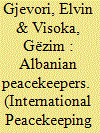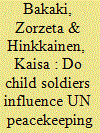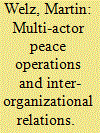| Srl | Item |
| 1 |
ID:
145594


|
|
|
|
|
| Summary/Abstract |
This article provides the first comprehensive account of Albania’s contribution to international peacekeeping and explores its inward-looking rationales for providing peacekeepers. Specifically, we examine why Albania has energetically supported NATO- and EU-led military and crisis management operations and less so UN peacekeeping missions. We find that Albania’s contribution to peacekeeping operations has been primarily shaped by its inward-looking interests for accelerating membership in NATO, fostering integration in the EU, as well as reducing domestic and regional insecurities. Pinpointing accurately the motivations among troop-contributing states helps recover the true hierarchical order of rationales and explain why, in some cases, the performance and impact of peacekeeping operations for some contributing states is secondary. Overall, disentangling the inward-looking utility of peacekeeping by a small state such as Albania provides useful insights for understanding how regional integration dynamics affect peacekeeping.
|
|
|
|
|
|
|
|
|
|
|
|
|
|
|
|
| 2 |
ID:
145595


|
|
|
|
|
| Summary/Abstract |
The use of child soldiers in conflicts has received increasing academic attention in recent years. This article examines post-conflict periods to see whether the use of child soldiers mobilizes United Nations peacekeeping operations (UN PKO) in the aftermath of a conflict. Taking into consideration how child soldiers affect conflict and how important their reintegration is to sustainable peace and post-conflict development, we analyse whether the presence of child soldiers in a civil war increases the likelihood of the presence of a PKO. We argue that the UN deems a conflict with child soldiers as a difficult case for conflict resolution, necessitating a response from the international community. This is in line with our empirical results confirming that the use of child soldiers significantly increases the likelihood of peacekeeping.
|
|
|
|
|
|
|
|
|
|
|
|
|
|
|
|
| 3 |
ID:
145596


|
|
|
|
|
| Summary/Abstract |
Multi-actor peace operations have become the dominant mode of peace operations since the end of the cold war. This article uses the literature on institutional linkages and inter-organizational relations, thus far developed independently from the literature on such operations, to shed light on the relations between the organizations involved in them. The analysis of one specific case – the interactions between the United Nations, the African Union, the Economic Community of Central African States and the European Union in the Central African Republic – shows the usefulness of merging this body of theory with the primarily empirically driven research on peace operations and UN–regional collaboration. The findings of this study are meant to facilitate further research on multi-actor peace operations and serve as a building block for a theory explaining the emergence and configuration of such operations.
|
|
|
|
|
|
|
|
|
|
|
|
|
|
|
|